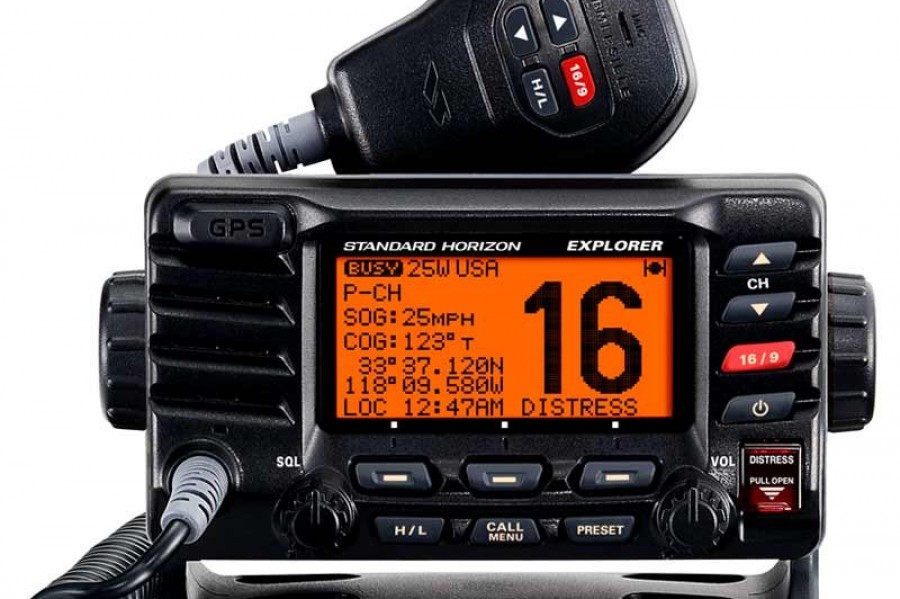Short Range (VHF) Radio Course
This one-day classroom based - VHF radio course teaches all you need to know to operate a marine band VHF radio fitted with a Global Maritime Distress and Safety System (GMDSS) DSC controller.
In addition to teaching the use of VHF radio for normal voice communications, this course includes the emergency operating procedures for the use of VHF radio DSC controllers, Emergency Position Indicating Radio Beacons (EPIRB) and Search and Rescue Transponders (SART). Extensive use is made of our training equipment enabling you to practice in realistic scenarios.
By the end of your day in the classroom you will be confident in the use of VHF Radios and have a good knowledge of associated GMDSS equipment.
Following successful completion of the Short Range Certificate examination, which is taken after the course, you will be qualified to operate a marine band VHF Radio.
An additional licence fee of £70 will be payable at the start of your examination.
What is VHF Digital Selective Calling DSC?
VHF Digital Selective Calling (DSC) provides a means of automating all day-to-day marine terrestrial calling - making the marine radio as easy to use as a telephone. DSC effectively provides the operator with a digital dialling system capable of ringing an alarm at a distant radio station when a call is addressed to that station.
Under GMDSS, all vessels are allocated a unique Maritime Mobile Service Identity (MMSI), which is a unique nine digit code. The digital calling information is transmitted on specially designated channels. In the case of a VHF radio, this is Channel 70. Channel 70 is dedicated for DSC use and must under no circumstances be used for anything else. An added benefit of DSC is that the digital dialling signal can also carry other information, such as your vessel’s identity, position and the nature of the call as well as information specifying the channel upon which subsequent communication should take place. The entire message is transmitted in one quick burst, thus reducing the demand time on the calling channel.
In a distress situation, all necessary information can be sent automatically at the touch of a single button. The vessel’s position can be determined from a GPS navigation receiver connected to the radio or entered manually. Its identity is permanently coded into the radio in the form of the allocated vessels MMSI number. The nature of distress can also be selected by the operator if there is time to do so. Using digital coding, DSC automates all the radio functions with which existing marine operators are familiar.. Operators must be licensed to use the equipment onboard the vessel so, should hold the the VHF Licence, Short Range Certificate or equivalent.
What is GMDSS?
The Global Maritime Distress and Safety System (GMDSS) is an international system that uses terrestrial and satellite technology and ship-board radio systems to ensure rapid, automated alerting of shore-based communication and rescue authorities, in addition to ships in the immediate vicinity, in the event of a marine distress.
Under the GMDSS, all cargo ships of 300 gross registered tonnes and upwards and all passenger ships engaged on international voyages must be equipped with radio equipment that conforms to international standards as set out in the system. The basic concept is that search and rescue authorities ashore, as well as shipping in the immediate vicinity of the ship in distress, will be rapidly alerted through satellite and terrestrial communication techniques so that they can assist in a co-ordinated search and rescue operation with the minimum of delay.
Yachts and Motorboats fitted with GMDSS equipment are safer at sea - and more likely to receive assistance in the event of a distress - because the GMDSS provides for automatic distress alerting and locating when you do not have time to send out a full distress call. The GMDSS also requires ships to receive broadcasts of maritime safety information which could prevent a distress from happening, and requires ships to carry satellite emergency position indicating beacons (EPIRBs), which float free from a sinking ship and alert rescue authorities with the ship's identity and location.



